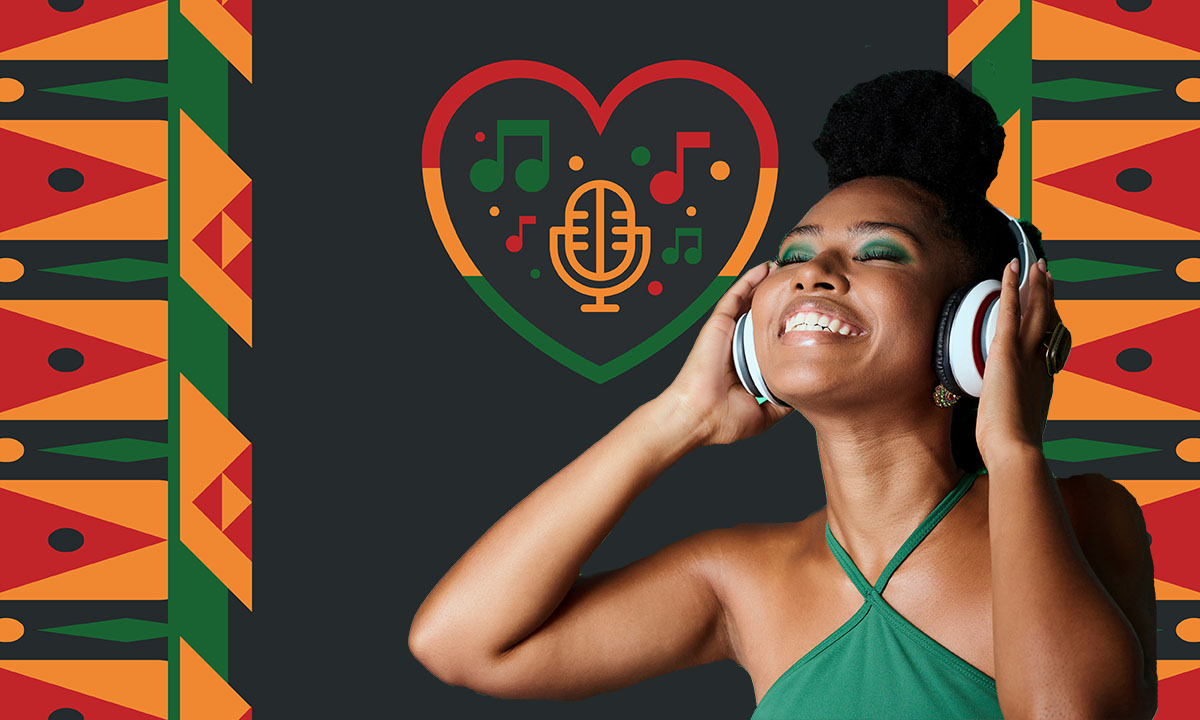Table of Contents
National Black Music Month started nearly 45 years ago and celebrates the musical traditions of African Americans through all genres. From the highly energized guitar work of Rock and Roll legends to the smooth sounds of Jazz greats and the more recent and just as iconic rap artists of today, Black music is everything that should be celebrated about African American culture.
However, music can do much more than sing gospel and narrow racial divides. Music can heal us physically and mentally, improving heart health and lifting our moods. Below, we look at many of the ways music can boost our health and then bring us together for Black Music Month.
Music And Your Health
Our physical, psychological, and mental health can be affected in various ways by the music we listen to. From music therapy now offered in many school districts based on sound research to music artists visiting patients in hospitals, songs can be healing and even prevent long-term illness.
Physical Health
Listening to music affects our physical health in many ways, from calming our heart rate and blood pressure to reducing pain. Even singing a song to an infant as they fall asleep can help them get through the night peacefully.
- Balance: Many older adults experience uneven gait or will fall at some point during their lifetime. Those with conditions such as Parkinson’s are at even higher risk for falls. Walking with music has been shown to improve gait when balance training during physical therapy.
- Heart Rate: A study published in 2022 by Cereus found that classical music affects the autonomic nervous system, triggering a calming reaction that can reduce the heart rate. This is especially beneficial for those with heart disease.
- Blood Pressure: The same study noted a decrease in blood pressure. Over 80% of those taking part in the study found that fast-paced dance music had a positive impact on mood, lowering their stress level and blood pressure.
- Pain: In a meta-analysis of nearly 100 studies, a researcher from Ewha Womans University in Seoul, Korea found that music had a significant impact on chronic pain relief. It seemed to help more than some opioid and non-opioid pain medications in some instances.
- Endurance: It’s believed that music may help stimulate the body during cardio and strength-building exercise to help increase endurance. This could possibly be affected by increased motivation, a psychological effect of listening to music.
- Sleep: Sleep quality is significantly improved in both children and adults when listening to calming music before bed. Relaxing music prior to sleep results in less sleep disturbance throughout the night for a more restful night.
Psychological Health
Music also affects our psychological health, helping to increase our brain’s functioning and improve performance, from learning to creativity to motivation.
- Cognitive Performance: Interestingly, not everyone performs better during mental tasks while listening to music. If you are one of the many who learns better while enjoying the amplified sounds through your headphones, it could be that music helps to improve your cognitive performance.
- Creativity: The same way music affects cognitive performance, it can enhance divergent thinking, which is a key element of creativity, especially when it comes to artistic work.
- Motivation: Music affects the entire brain, making it work more efficiently and strengthening the neural pathways that connect the various areas, such as the cerebellum and limbic system. In other words, music gives your brain a mental boost.
Mental Health
When we think about listening to music and how it affects us, most of us think about our mental health. Listening to the music a little too loud on the ride home from work can be cathartic if you’ve had a hard day. A breakup playlist might be just what you need if you’ve had your heart broken. Or perhaps you have an exciting road trip playlist ready for that long drive to visit a friend. Pressing play on the right song might be just what you need if you find yourself in need of a mental health boost.
- Mood: Music can influence your moods by either playing into the emotions you are feeling, allowing you to release them, or giving you a way to disengage from the mood of the moment, distracting you for a moment so you can process them later. This is a healthy way of coping with strong emotions so long as you come back to revisit them when you are able.
- Stress: The University of Nevada describes the scientific reasons music helps us relax from stressful situations. Certain songs may help the brain’s alpha brainwaves sync to the beat, creating a rhythmic flow that is only present when we are conscious but relaxed.
- Depression: Medical News Today reports that music therapy helps to support medication and talk therapy for those experiencing depression, making them more effective at lifting mood by increasing levels of dopamine.
- Anxiety: The same article explains that music therapy can reduce the levels of stress hormones, which can reduce symptoms of anxiety. Results can be seen immediately whereas other anxiety treatments could take weeks or months to be effective.
- Serious Mental Illness (SMI): SMI includes such diagnoses as bipolar disorder, schizophrenia, PTSD, and borderline personality disorder. Nearly 350 studies reviewed by Frontiers in Psychology showed music to be beneficial in treating severe mental illness.. It has far-reaching benefits when treating them alongside medication management and talk therapy.
The History of Black Music Month
President Jimmy Carter first designated June as Black Music Month in 1979. It was later updated to African American Music Month by President Barack Obama. The month-long celebration of the sound, song, and stories of what has become the Black music industry began with a presidential proclamation but has become something much more. Today, Black music is used to address social concerns, spread cultural pride, and reach new, young audiences regardless of race.
Music Genres Created and Influenced by Black Musicians
Black music started from the beginning and grew from the sounds and turmoil facing the slaves of the South. From such strife came the songs and lyrics we still listen to today. Let’s take a closer look at the genres inspired by some of the most prominent African American musicians.
- Sacred Music: Gospel music plays during many services even today but has its roots in the musical traditions of enslaved African Americans of the South. This music often inspired other genres.
- Folk Music: These lyrics are also inspired by cultural traditions rooted in slavery and were the beginnings of the hip hop and rap movement of today.
- The Blues: The Blues form a solid foundation for modern music in America. It was also geographically different. Listening to the Blues in Chicago was very different from Southern Texas, as the lyrics spoke of both the troubles and the cultural uniqueness of each location.
- Military Music: While African American music was unique back home, it became unique on the front lines as Black countrymen incorporated their own style into traditional military tunes.
- Jazz: Jazz was a “musical innovation” that began in New Orleans as an instrumental form of expression. It is often made up on the spot with elaborate solos from talented band performers.
- Rhythm and Blues: Gospel, the Blues, and Jazz all influence R&B music, which began in the 1940s. It helped to spread African American culture to new audiences. Today, it also incorporates elements of Soul and Funk.
- Rock and Roll: African Americans have claimed their own special place in the Rock and Roll Hall of fame with many big musicians. The genre is one of the largest today and blends country music, Pop, and others.
- Hip Hop and Rap: Today, hip hop and rap are a billboard for social and political issues facing African American culture. Black musicians share their views through streaming services, radio, and other creative ways.
- Others: There are many other genres of music that should be recognized, such as Funk and Motown, Boogie Woogie, and Soul. African American music has touched on nearly every genre throughout the genrations.
African American Musicians
National Black Music Month is founded on the musicians of the past, including such names as Diana Ross, Tina Turner, and the classical composer Florence Price. There are too many key figures to list, but we can start with a few of the most notable ones who laid the foundation for the Black artists of today.
- Aretha Franklin
- Ella Fitzgerald
- Ray Charles
- Jimi Hendrix
- James Brown
- Stevie Wonder
- Michael Jackson
- Prince
- Little Richard
- Tina Turner
Today, African American musicians touch every genre, from country music to hip hop. In their music, you’ll find cultural pride expressed, paying homage to the musicians of the past, and many examples of what’s made their music what it is today.
- Lizzo
- Usher
- Alicia Keys
- Rihanna
- Darius Rucker
- John Legend
- The Weeknd
- Khalid
Black Music Month and Your Health
June is National Black Music Month and Black Health Matters wants to celebrate with you. Our story starts with you, so choose your favorite African American artists and give a listen, then make it a part of your daily self care. Why not try experiencing something new as well?There’s no shortage of amazing artists to listen to.








More Stories
Thoughts as of late: on evolving, growing & that tiny voice inside
County Health Officials Report 17% Increase in Tuberculosis Cases
10 Most Nutrient-Rich Foods To Include In Your Diet